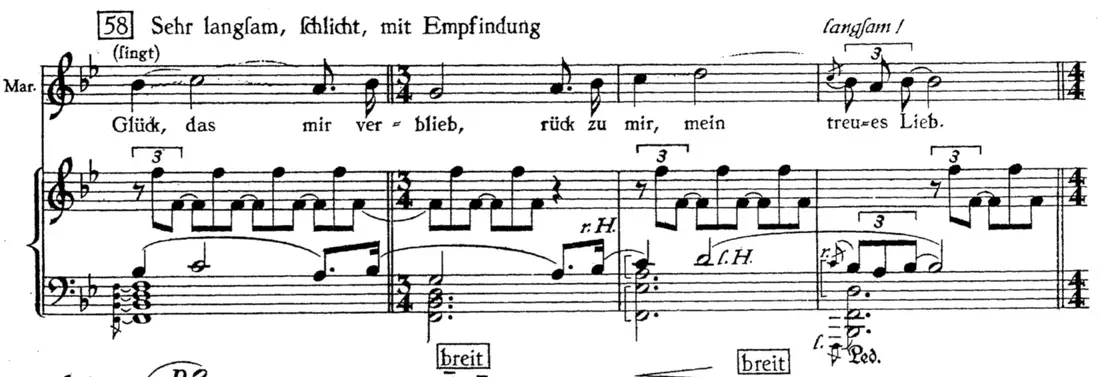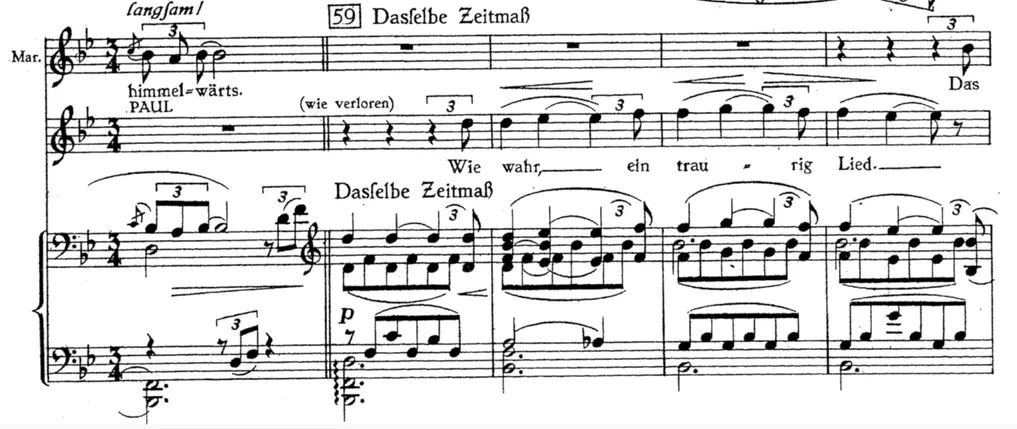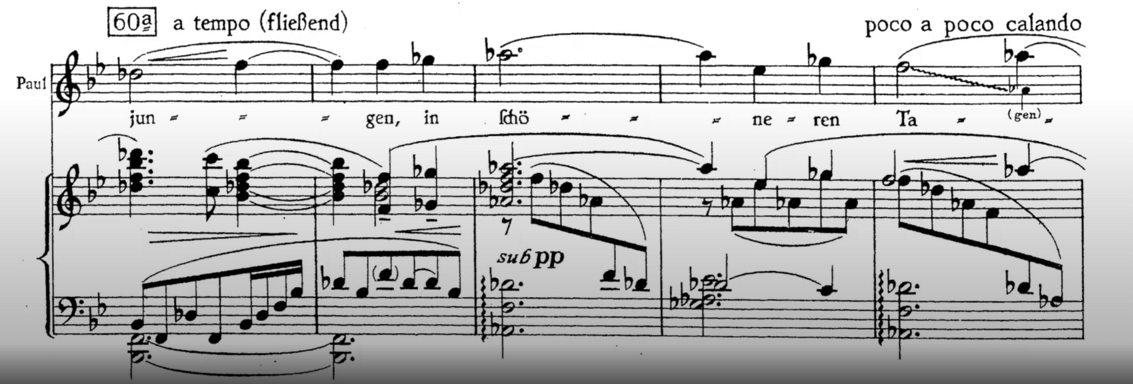The portrait of Erich Korngold’s aria GLÜCK, DAS MIR VERBLIEB
Read Interesting facts and hear great YouTube Videos about Korngold’s famous Aria “GLÜCK, DAS MIR VERBLIEB“.
If you want to read and hear more about THE DEAD CITY, click on this link to the opera portrait
The aria GLÜCK, DAS MIR VERBLIEB – Synopsis & Background
Synopsis: In Paul’s gloomy apartment in Bruges. The housekeeper Brigitta receives Paul’s old friend Frank, who has rushed over. They look at the decorated picture of Paul’s deceased wife, in front of whom a hair braid of Marie is displayed like a relic. Brigitta tells him about Paul’s strange state. Paul comes back to his apartment and is pleased to see his friend Frank. Paul does not appear to Frank at all as Brigitta had described him. Almost ecstatically he tells of an encounter he had with his imaginary wife in his arms during one of his lonely walks. He saw a woman who looked like his Marie. The next day he spoke to her, her voice was like Marie’s, God had given her back to him. Frank tries to explain to him that he had fallen into the delusion of “the dream of returning”. But Frank does not want to know anything about it. The bell rings, Paul is already expecting Marietta. He looks at the picture of his wife and is happy that God has given her back to him! Marietta enters, and Paul is fascinated by her, who looks so deceptively like his Marie. When he gives her a scarf, and she throws it over herself, he calls ecstatically “Marie! Marietta is a dancer who is passing through during an engagement in Bruges. When she sees a lute in the apartment, she happily sings a song to Paul. Paul is moved, it is exactly the same song that Marie used to sing.
This piece is Korngold’s most famous ever. It is a nostalgic solo piece (which turns into a duet) in the middle of a psychodrama. It has the function of making the relationship between Paul and Marietta emotional for the listener, in order to create a maximum contrast to the drama that follows, which goes as far as Paul’s murder of Marietta. The character of this piece is songlike or even operetta-like. It is kept in an A-B-A form, with the B-part comprising only a short dialogue.
Already at the beginning the orchestra glitters, which with glockenspiel, celesta and harp has a typical late romantic coloring. The bells of the celesta conjure up a romantic, almost childishly naive mood:
Marietta sets in, Korngold writes “very slowly, simply with feeling”.
The piece is largely written in high tessitura to let the excitement of the two be felt. On the word “Abend” (evening) the voice goes to the high B flat in piano:
Soon after, Paul’s voice joins in, full of melancholy and sadness:
Towards the end of the A part, when Paul sings “Ich hört es oft” (I often heard it”), we hear a masterful passage that Paul sings over a dominant seventh chord that expresses infinite melancholy…
… and instead of dissolving it into the major key, Korngold briefly changes the music in the minor key which immediately climbs up to D flat major, in which he lets us wallow in pleasure in the music for the last bars of the A section (beginning with “schönsten”):
The Aria – the text of GLÜCK, DAS MIR VERBLIEB
Glück, das mir verblieb,
Rück zu mir, mein treues Lieb.
Abend sinkt im Haag
Bist mir Licht und Tag.
Bange pochet Herz an Herz.
Hoffnung schwingt sich himmelwärts.PAUL
(wie verloren)
Wie wahr, ein traurig Lied.MARIETTA
Das Lied vom treuen Lieb,
Das sterben muß.(wird aufmerksam)
Was haben Sie?
PAUL
Ich kenne das Lied.
Ich hört es oft in jungen,
In Schöneren Tagen…
Es hat noch eine Strophe,
Weiß ich sie noch?(er setzt mechanisch fort. Sie spielt die Laute und fällt
ein. Die Strahlen der untergehenden Sonne überfluten
beide.)Naht auch Sorge trüb,
Rück zu mir, mein treues Lieb.
Neig dein blaß Gesicht,
Sterben trennt uns nicht.
Mußt du einmal von mir gehn,
Glaub, es gibt ein Auferstehn.
Joy, that remained to me,
Back to me, my faithful love.
Evening falls in the Hague
I am light and day.
Bange pushes heart to heart.
Hope is swinging heavenwards.PAUL
(as lost)
How true, a sad song.MARIETTA
The song of the faithful love,
That must die.(becomes attentive)
What do you have?
PAUL
I know this song.
I often hear it in boys,
In Nicer days …
It still has a stanza,
Do I still remember her?(He continues mechanically.) She plays the lute and falls
on. The rays of the setting sun are flooding
both.)Seam also worry cloudy,
Back to me, my faithful love.
Tilt your pale face,
Dying does not separate us.
Do you ever have to go from me,
Believe, there is a resurgence.
Famous interpretations of GLÜCK, DAS MIR VERBLIEB
We first hear the duet in the original instrumentation for soprano and tenor.
First in the recording with Jonas Kaufmann and Julia Leiter. Kaufmann debuted in 2019 in the role of Paul.
Glück, das mir verblieb – Kaufmann / Leiter
The next version with the dream couple of the twenties, Richard Tauber and Lotte Lehmann. You can hear more from Lotte Lehmann below. Erich Korngold called Richard Tauber “the ideal Paul”.
Glück, das mir verblieb – Lehmann / Tauber
The following recordings are solo versions for soprano:
A heavenly version of Elisabeth Schwarzkopf, which is characterized by the slow tempo. The longing of her voice, hoarse with excitement, languishes in the best sense.
Glück, das mir verblieb – Schwarzkopf
Maria Jeritza made her debut in New York in the role of Marietta and began her world career with this role.
Glück, das mir verblieb – Jeritza
Lotte Lehmann was the great rival of the Jeritza. On several occasions the two performed together and Lehmann said that the Jeritza also punched her in the ribs on stage to make her look better. In the duel of the two singers in this aria, Lehmann comes off much better, you only hear “Abend” “evening” with the high B flat, which Lehmann climbs beautifully (0:34) while the Jeritza bypasses the high note (see above).
Glück, das mir verblieb – Lehmann
Peter Lutz, opera-inside, the online opera guide to the song “GLÜCK, DAS MIR VERBLIEB” from the opera “The dead city” from Erich Korngold.










Leave a Reply
Want to join the discussion?Feel free to contribute!